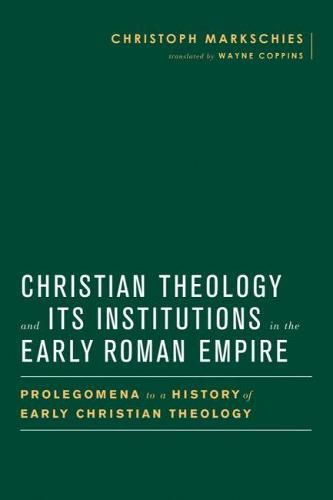Readings Newsletter
Become a Readings Member to make your shopping experience even easier.
Sign in or sign up for free!
You’re not far away from qualifying for FREE standard shipping within Australia
You’ve qualified for FREE standard shipping within Australia
The cart is loading…






Tension between unity and diversity plagues any attempt to recount the development of earliest Christianity. Explanations run the gamutafrom asserting the presence of a fully formed and accepted unity at the beginning of Christianity to the hypothesis that understands orthodox unity as a later imposition upon Christianity by Rome. In Christian Theology and Its Institutions in the Early Roman Empire , Christoph Markschies seeks to unravel the complex problem of unity and diversity by carefully examining the institutional settings for the development of Christian theology. Specifically, Markschies contends that theological diversity is closely bound up with institutional diversity. Markschies clears the ground by tracing how previous studies fail to appreciate the critical role that diverse Christian institutions played in creating and establishing the very theological ideas that later came to define them. He next examines three distinct forms of institutional lifeathe Christian institutions of (higher) learning, prophecy, and worshipaand their respective contributions to Christianity’s development. Markschies then focuses his attention on the development of the New Testament canon, demonstrating how different institutions developed their own respective canons, while challenging views that assign a decisive role to Athanasius, Marcion, or the Gnostics. Markschies concludes by arguing that the complementary model of the identity and plurality of early Christianity is better equipped to address the question of unity and diversity than Walter Bauer’s cultural Protestant model of orthodoxy and heresy or the Jesuit model of the inculturation of Christianity.
$9.00 standard shipping within Australia
FREE standard shipping within Australia for orders over $100.00
Express & International shipping calculated at checkout
Tension between unity and diversity plagues any attempt to recount the development of earliest Christianity. Explanations run the gamutafrom asserting the presence of a fully formed and accepted unity at the beginning of Christianity to the hypothesis that understands orthodox unity as a later imposition upon Christianity by Rome. In Christian Theology and Its Institutions in the Early Roman Empire , Christoph Markschies seeks to unravel the complex problem of unity and diversity by carefully examining the institutional settings for the development of Christian theology. Specifically, Markschies contends that theological diversity is closely bound up with institutional diversity. Markschies clears the ground by tracing how previous studies fail to appreciate the critical role that diverse Christian institutions played in creating and establishing the very theological ideas that later came to define them. He next examines three distinct forms of institutional lifeathe Christian institutions of (higher) learning, prophecy, and worshipaand their respective contributions to Christianity’s development. Markschies then focuses his attention on the development of the New Testament canon, demonstrating how different institutions developed their own respective canons, while challenging views that assign a decisive role to Athanasius, Marcion, or the Gnostics. Markschies concludes by arguing that the complementary model of the identity and plurality of early Christianity is better equipped to address the question of unity and diversity than Walter Bauer’s cultural Protestant model of orthodoxy and heresy or the Jesuit model of the inculturation of Christianity.